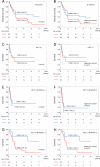Immunohistochemistry for CCR4 C-terminus predicts CCR4 mutations and mogamulizumab efficacy in adult T-cell leukemia/lymphoma
- PMID: 33022137
- PMCID: PMC7737778
- DOI: 10.1002/cjp2.180
Immunohistochemistry for CCR4 C-terminus predicts CCR4 mutations and mogamulizumab efficacy in adult T-cell leukemia/lymphoma
Abstract
Mogamulizumab targets extracellular N-terminal domain of CCR4, which is expressed in most adult T-cell leukemia/lymphoma (ATL) cases. Recently, we reported that CCR4 C-terminal gain-of-function mutations were frequent in ATL cases, and a subgroup with these mutations who were treated without allogenic hematopoietic stem cell transplantation (HSCT) and with mogamulizumab-containing [HSCT (-) and mogamulizumab (+)] regimens had a superior survival rate. Although these mutations are most likely a biomarker for predicting a strong response to mogamulizumab, their detection is time-consuming and costly. A more convenient screening tool may be necessary in the clinical setting. In this study, the clinicopathological importance of immunohistochemistry for the CCR4 N-terminus (CCR4-N-IHC) and C-terminus (CCR4-C-IHC) was examined in a large ATL cohort (n = 92). We found that CCR4-C-IHC, but not CCR4-N-IHC, was inversely correlated with the CCR4 mutation status. In ATL patients negative for CCR4-C-IHC, a subgroup treated with HSCT (-) and mogamulizumab (+) regimens showed a significantly better prognosis. In addition, CCR4-C-IHC was found to be a useful marker for high-sensitivity screening of the CCR4 mutational status (87%). The present study suggests that CCR4-C-IHC may be useful for identifying ATL patients harboring mutated CCR4 who may benefit from the superior efficacy of mogamulizumab-containing regimens and that CCR4-C-IHC may be a rapid and cost-efficient tool for screening for CCR4 mutation status.
Keywords: ATL; CCR4; immunohistochemistry; mogamulizumab; prognosis.
© 2020 The Authors. The Journal of Pathology: Clinical Research published by The Pathological Society of Great Britain and Ireland & John Wiley & Sons, Ltd.
Figures


References
-
- Uchiyama T, Yodoi J, Sagawa K, et al Adult T‐cell leukemia: clinical and hematologic features of 16 cases. Blood 1977; 50: 481–492. - PubMed
-
- Ishitsuka K, Tamura K. Human T‐cell leukaemia virus type I and adult T‐cell leukaemia‐lymphoma. Lancet Oncol 2014; 15: e517–e526. - PubMed
-
- Matsuoka M, Jeang KT. Human T‐cell leukaemia virus type 1 (HTLV‐1) infectivity and cellular transformation. Nat Rev Cancer 2007; 7: 270–280. - PubMed
-
- Ishii T, Ishida T, Utsunomiya A, et al Defucosylated humanized anti‐CCR4 monoclonal antibody KW‐0761 as a novel immunotherapeutic agent for adult T‐cell leukemia/lymphoma. Clin Cancer Res 2010; 16: 1520–1531. - PubMed
-
- Ishida T, Joh T, Uike N, et al Defucosylated anti‐CCR4 monoclonal antibody (KW‐0761) for relapsed adult T‐cell leukemia–lymphoma: a multicenter phase II study. J Clin Oncol 2012; 30: 837–842. - PubMed
Publication types
MeSH terms
Substances
LinkOut - more resources
Full Text Sources

